If you want to rank your local business higher in Google, you’re going to need backlinks.
According to local SEO statistics, like these results from a WhiteSpark survey, backlinks are a contributing factor in organic and map pack rankings.
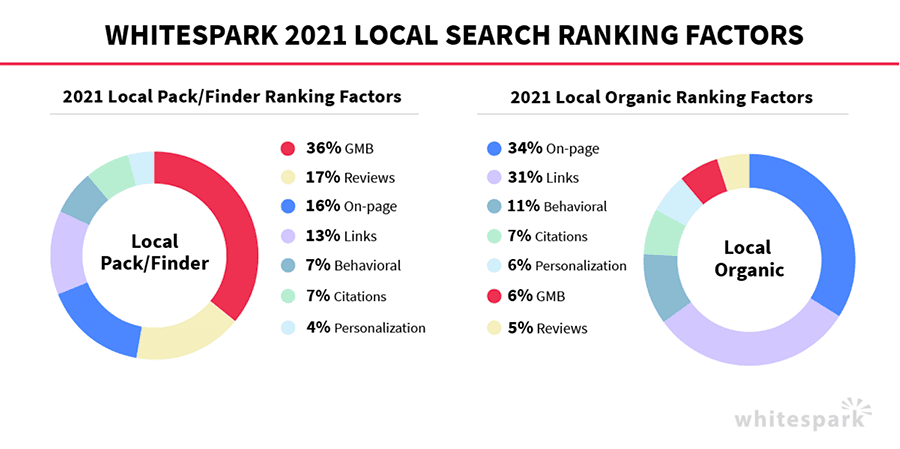
However, unlike traditional link building, local SEO requires that you attract backlinks from local websites, specifically.
Because of this, we’re going to show you 5 ways to get local backlinks that’ll help you rank your local business higher in Google for even the most competitive keywords.
Let’s go.
How is local link building different than traditional link building?
Link building is the process of getting relevant websites to link to a page on your website.
Local link building is the same thing, but you want to get links from topically and geographically relevant pages.
For example, if you’re a local photographer from St. Petersburg, Florida, then you’ll want a link from a website like this:
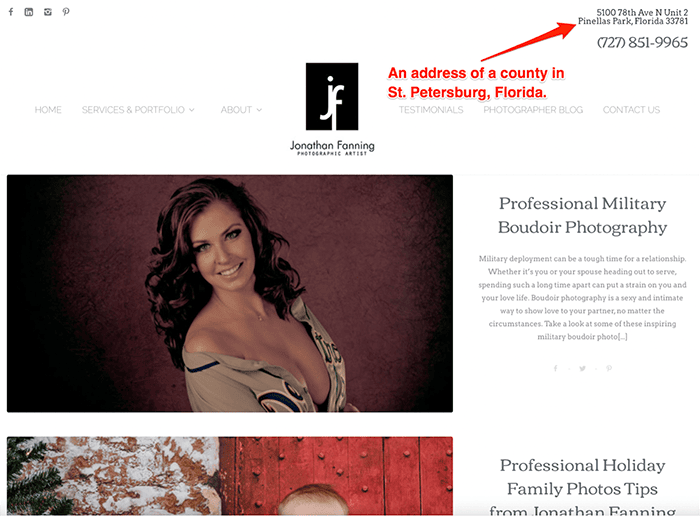
This is because it’s a website that’s topically relevant. It talks about photography, and it’s geographically relevant to St. Petersburg, as we can easily see from the address in the top right corner.
If you add authority into the mix, this diagram from Ahrefs’ local link building video illustrates how valuable different local links can be.

For local SEO, authority usually isn’t as important as the other 2 factors unless you’re in an extremely competitive niche where your competitors are very good at SEO.
With these things in mind, let’s jump into the 5 techniques to help you get backlinks that drive rankings for your local business.
5 local link building techniques and templates to try
1. Local community engagement
The easiest way to get tons of local links is to get involved in your local community.
Just like before the internet, sponsoring and helping out local groups or events is a great way to gain some local exposure for your local business.
The SEO benefit, however, is that you gain a local backlink!
This is because many local events have websites where they link out to their sponsors and partners.
For example, the Welcome to Rockville music festival in Jacksonville, Florida, has a “partners” section on their website where they link out to their sponsors.
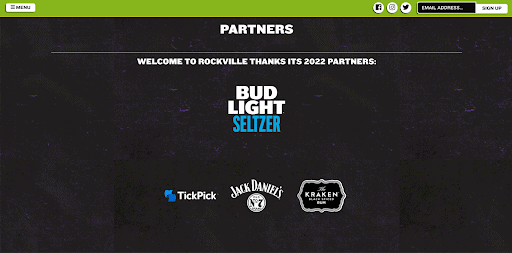
And if we inspect the code, we can see that it’s a dofollow backlink!

The authority is great, too.
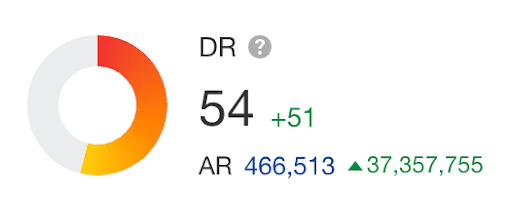
Probably the hardest part is finding local events to sponsor. Here are a few ways to do that:
- Ask your employees: If they’re part of a church, club, or D&D group that has a website, sponsoring this for a small payment of $40-$50 is a great way to get a quick local backlink.
- Local clubs: Leverage platforms like Meetup, Eventbrite, and Facebook Groups to find local groups and clubs that need a place to meet. If you’re a coffee shop or restaurant, offer up your location as a favor, then ask for a backlink from their website.
- Local calendars: Many local news sites have event calendars on their websites that you can browse through to find events to reach out to and sponsor.
Once you’ve found some events, groups, or clubs that interest you, send them this email with your sponsorship offer:



Hey [First Name]!
I was looking through some events on Meetup and found your local SEO group.
Do you guys need a place to meet up? I’d love to offer up our coffee shop during a weekday to help you guys out!
I’d just like to be listed on your website as a sponsor.
How does that sound?
[Your Signature]
Do this a few times and you’re bound to get some good local links. And if you’re the right type of business, this may help you generate revenue, too, by increasing foot traffic to your business!
While Google doesn’t like paid links, they seem to be okay with sponsorship links as these are good for local communities.
2. List outreach
List outreach is great for local businesses because these placements have potential to drive customers your way.
For example, if I search “best pizza near me” I see lists under the map pack.
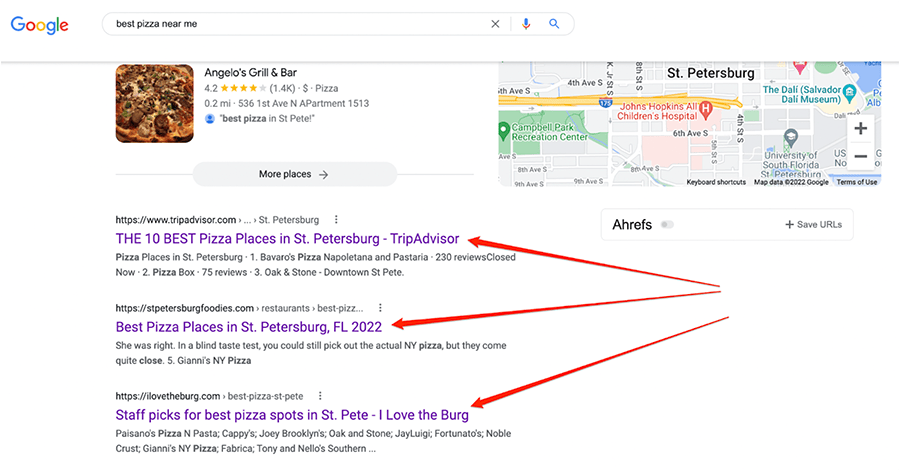
Same with keywords containing a city. Look what happens when I search “oklahoma city lawn care”:

Some of these are citations, which is why citation management is important. But for the ones that are blogs or informational websites, you can reach out and invite them to check out your business for consideration with a template like this to ask for a link:



Hey [First Name]!
Just read your article about [Topic] and I loved what you said about [thing you loved]!
I was wondering if, since you featured other [type of business] in your post, you’d be interested in checking out [your business] to see if it’s a fit for your list.
Want to come by sometime and check it out? Happy to give you a [what you’ll give] as a welcome gift!
Hope to hear back soon, thanks!
[Your Signature]
Just be sure you can actually give them what you’re offering and that your business is a fit for their article before you invest the effort.
3. Local resource page link building
According to Backlinko, resource page link building is “the practice of building backlinks from pages that have curated lists of links to external websites (resource pages).”
This campaign works really well because these pages are built just to link to stuff.
Here’s an example:

To find pages like this in your industry, you can combine some Google search operators with your industry. For example, if you’re a plumber in Tampa, Florida, some of these might be worth trying:
- plumbing inurl:resources.html inurl:tampa
- plumbing inurl:helpful-links intitle:tampa
- plumbing tampa inurl:links
Finding prospects locally can be tough if you’re trying to scale this up, but don’t give up. Different combinations of search terms pull up different results.
You can even try other search engines like Bing or DuckDuckGo to find a larger variety of results that you might not find through Google since their algorithms are different.
When you’ve found a good page target, send them an email like this:



Hey [First Name]!
I was looking for some information on [Topic] today and found this page: [URL]
Loved the resources you put there for [Reason]!
Anyway, I realized that I recently published a blog post about [Related Topic]: [URL].
It covers [Description].
I thought it would fit nicely under the [Section Name] section of your page.
If you like it, would you mind adding a link to it?
Hope to hear back, thanks!
[Signature]
This works best with blog content, but if your business adds real value to the page and the website owner would want to link to it, you can try just pitching your homepage.
4. Local guest posting
Guest posting is a very common link building strategy where you reach out to niche websites and bloggers, pitch content ideas, and write the whole article for them with a link to your site inside that article.
With guest posting, you can hand-pick the sites you want to write for, choose the link placement, and control the anchor text, which is a pretty big ranking factor.
To find local websites to pitch, we can use Google Maps.
When doing this, you want to find businesses where your knowledge of subject matter offers some sort of value.
For example, with our lawn care service, we pitch real estate agencies because we can write about how lawn care helps sell homes. This is an area of subject matter that the client has a better understanding of than the prospect likely does, so we’re more likely to land our pitch.
If we follow this example, we’d enter “real estate agents” into Google Maps.
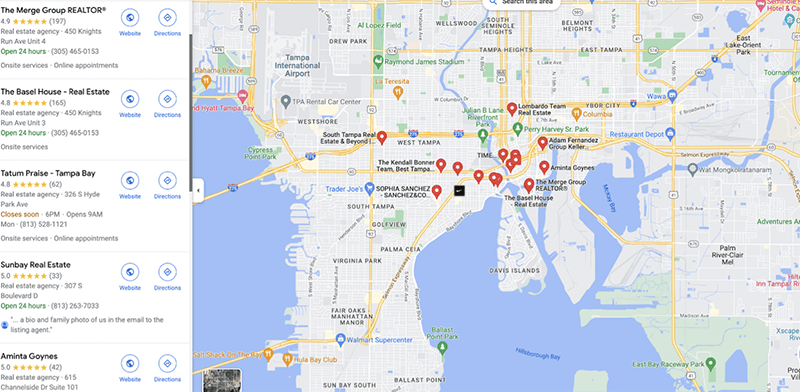
From here, we can find their contact information on the website and send a template like this:



Hey [First Name]!
I’m reaching out today because I have some article ideas for your website that I think your potential customers would get a lot of value from!
With us being [City] locals and subject matter experts in landscaping and property management, I think we can write an article that would be super useful to your business and customers (not to mention the SEO value!)
Can I go ahead and send over my topic ideas?
[Your name]
Once they respond, send over some ideas based on the content they have on their website.
For example, if they have tons of “how to” articles, pitch something with a similar headline. You’re likely to tap into their sense of familiarity, which will help you win the pitch and land the placement.
This works very well. Using the exact framework and pitch above, we were able to land guest posts like this for our lawn care client:
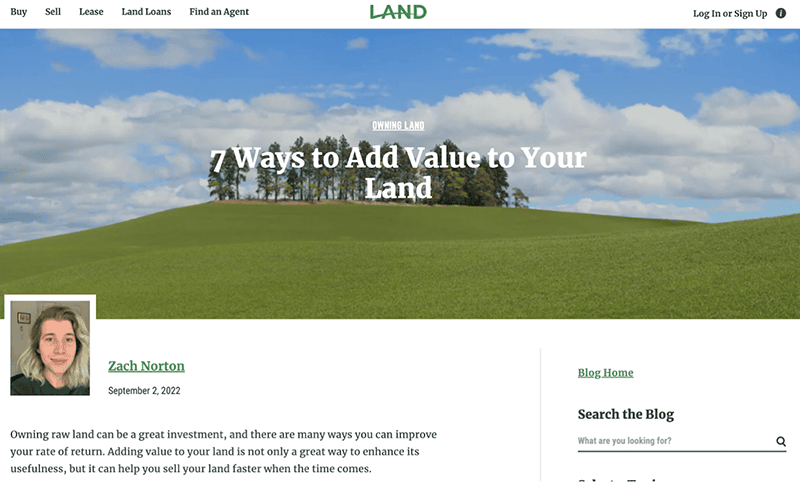
If you need more help writing pitches for guest posts, check out our guest posting guide. You can also check out our guest posting email templates for some quick ideas.
5. Local digital PR
Digital PR is how you use content to get PR placements like this one that we got for our law firm client:
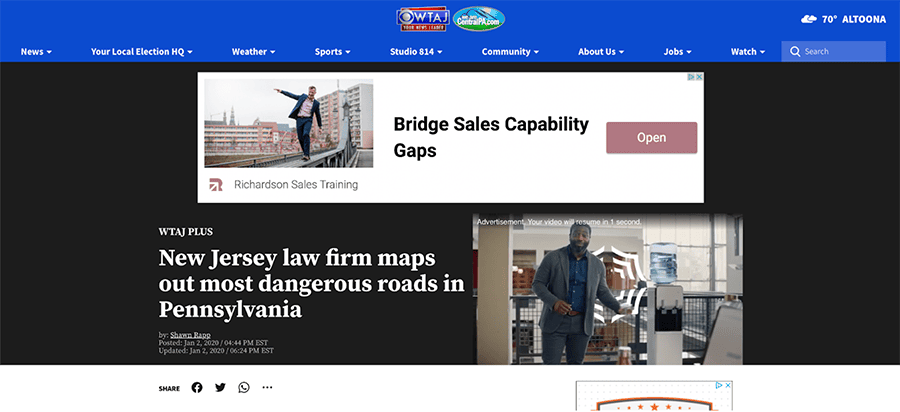
These placements also come with nice local backlinks:
Journalists love data, and local journalists love do-good stories, so the easiest way to win placements like this is to create a data-driven map and combine it with a do-good angle.
Here’s how:
First, think about how the data you’re going to map will help their audience accomplish a specific outcome that’s tied to one of the following emotions:
- Awe 🤯
- Surprise 😲
- Anger 😡
- Anxiety 😰
- Interest 🤔
Next, write some pitch angle ideas using the framework of “We built a map of X to help with Y.”
Here are some example of this:
- “We built this map of Tampa Airport’s busiest times to help travelers book better flights.”
- “We mapped Miami’s construction history over the last 15 years to help people plan their real estate investments.”
- “We mapped all of the fastest non-highway routes throughout the city to help LA residents save time during busy highway hours.”
Whatever it is, it doesn’t need to be complicated. For our map, we got data from the New Jersey Department of Transportation. However, something simple can work too, like a dog park map if you’re a pet shop.
Once you have your data, make an infographic and publish it on your website, like so:
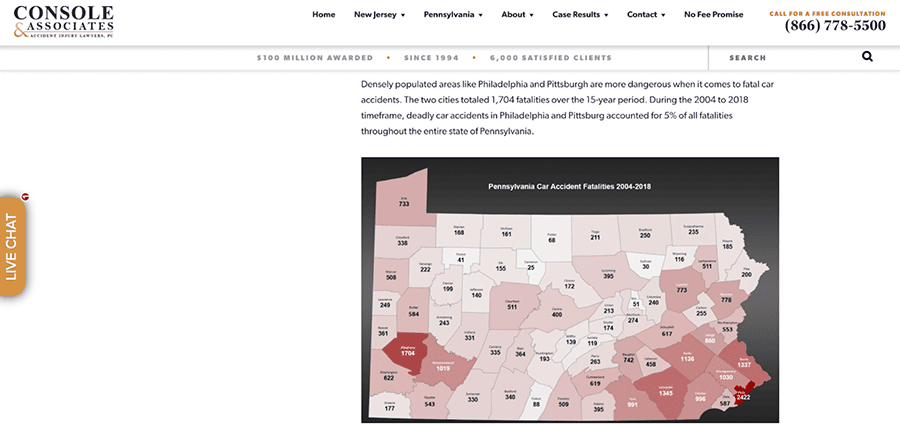
This will give journalists a place to link to.
Finally, pitch it out with an email template like this one that we used to get the placement above:



Hey {{first:guys}},
My name is [Your Name] and I’m the [Your Title] at [Your Business].
I’m emailing you today because we just built a map that shows [what your map shows and why].
Since you’ve reported on this kind of thing before, I thought it would interest you.
Mind if I send over the press release for you to take a look at?
[Your signature]
On response, you may need to send a press release about the story behind the data.
If you do, here’s a template you can use from Shopify.
In many cases, however, a press release isn’t mandatory and you can get the story published just because the visual is awesome and helpful to their audience.
Conclusion
These are just a few ways to get local backlinks to your website, so be sure to try them out.
If they work, or they don’t work and you need help, let us know in the comments below! 👇

Nice Post